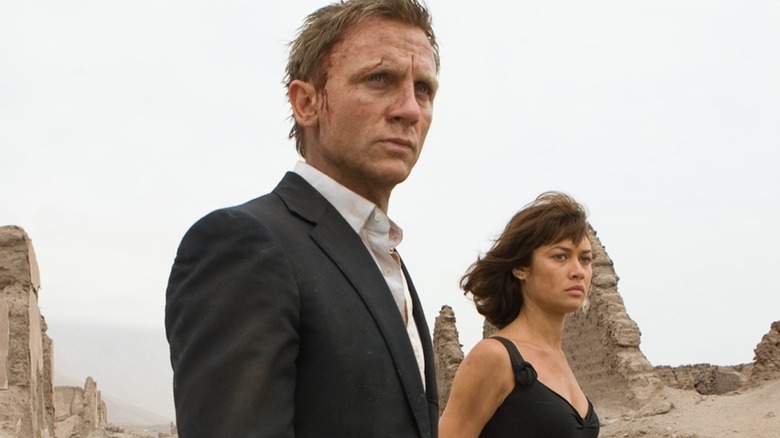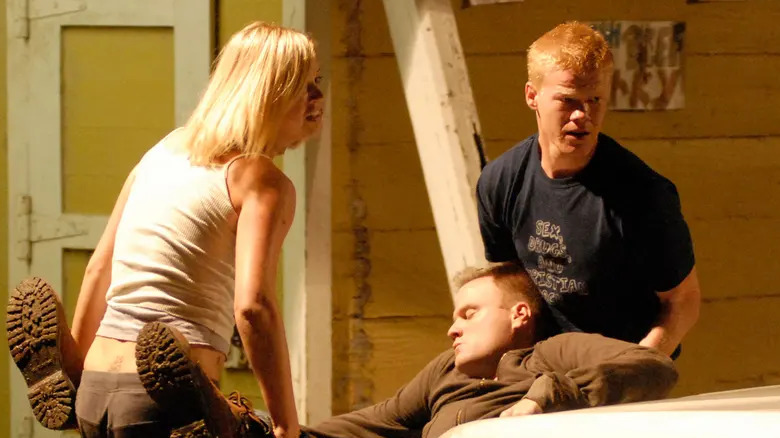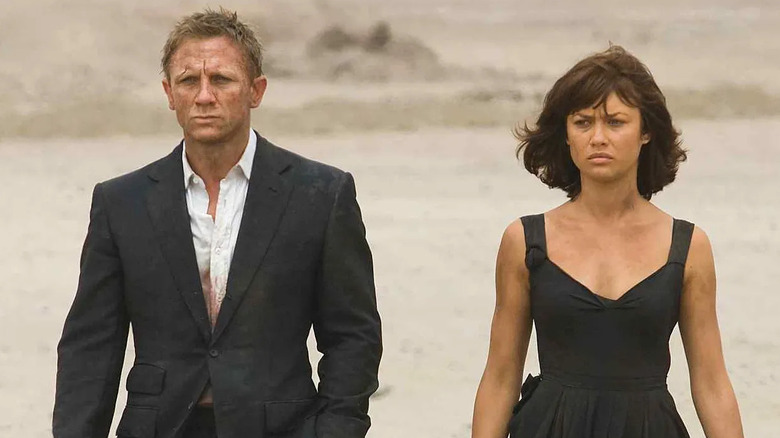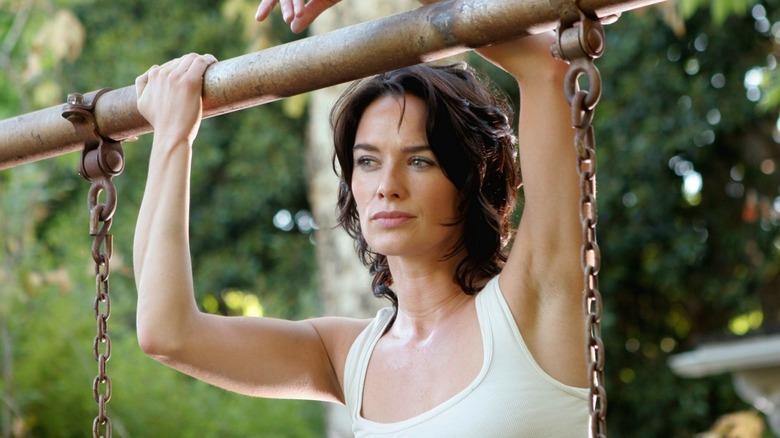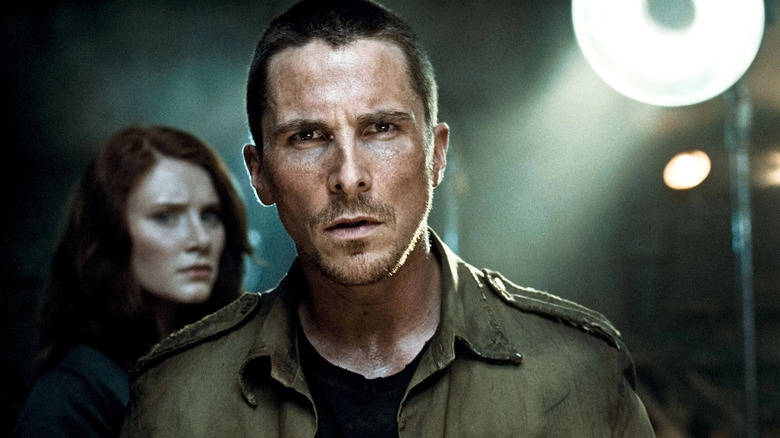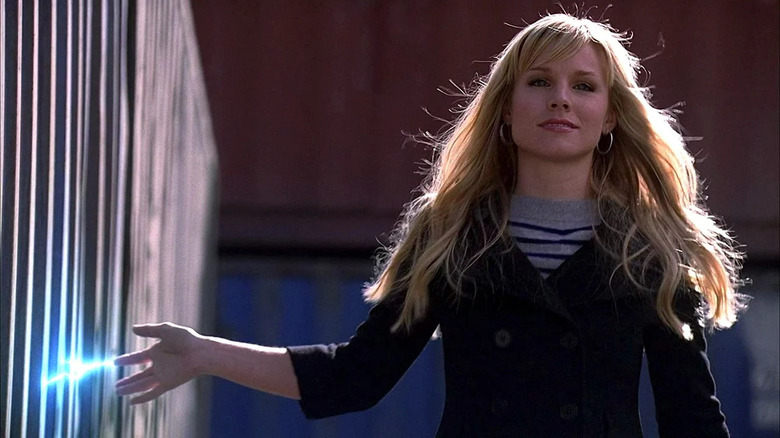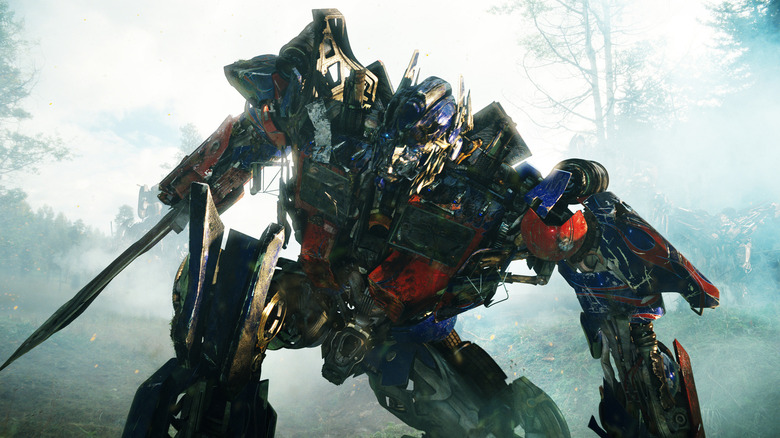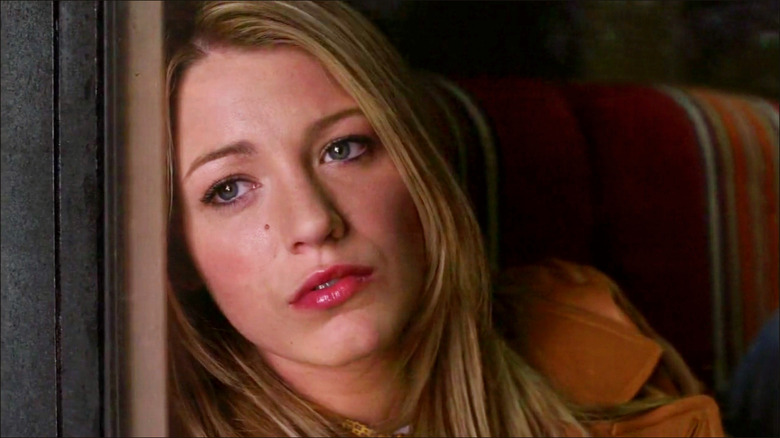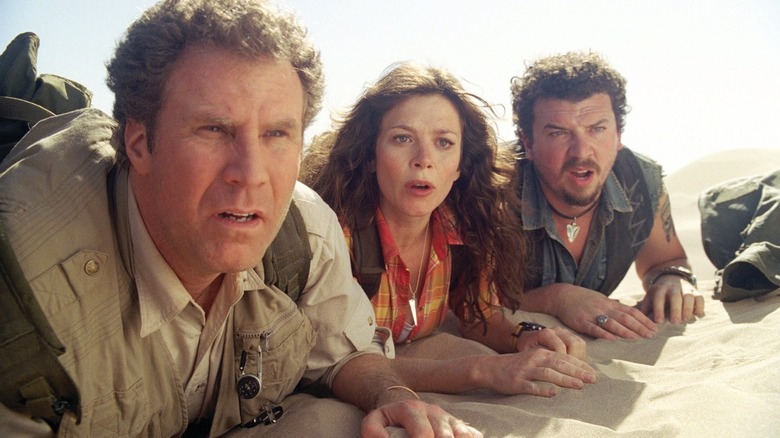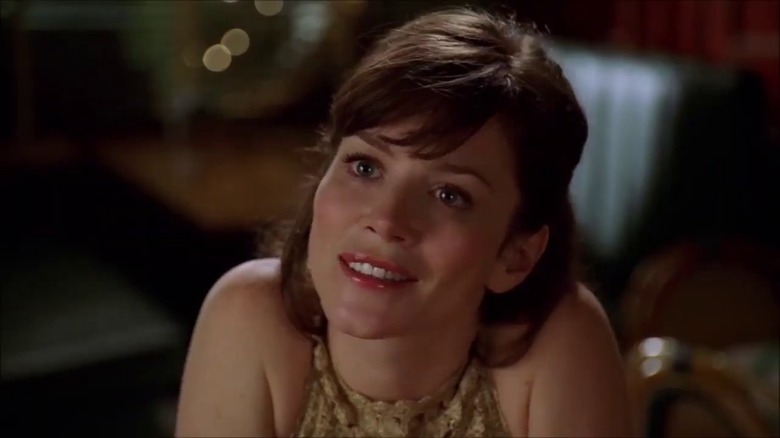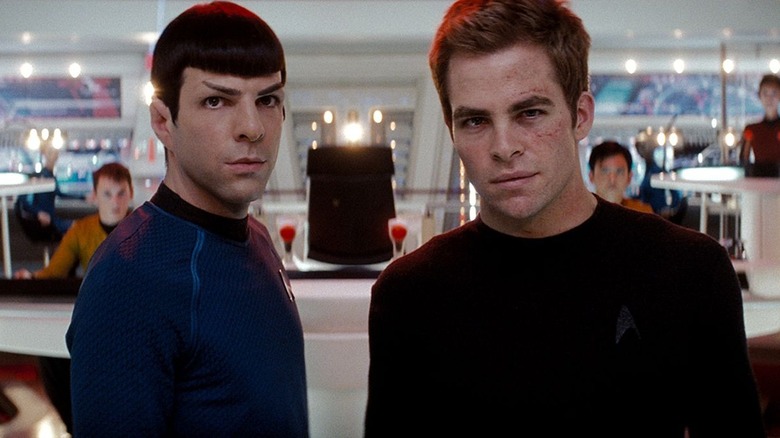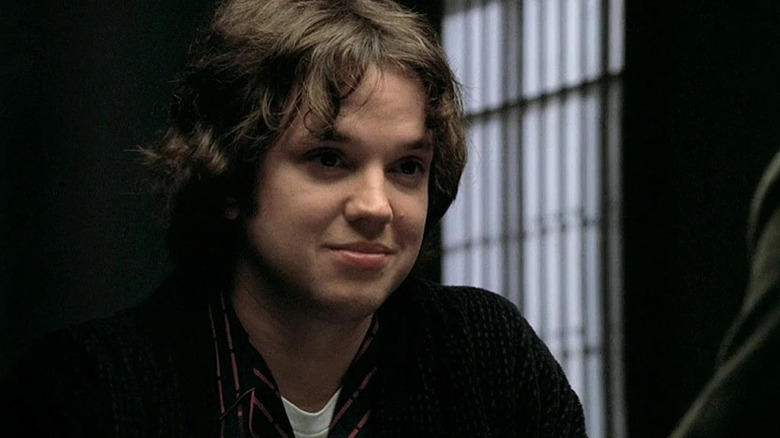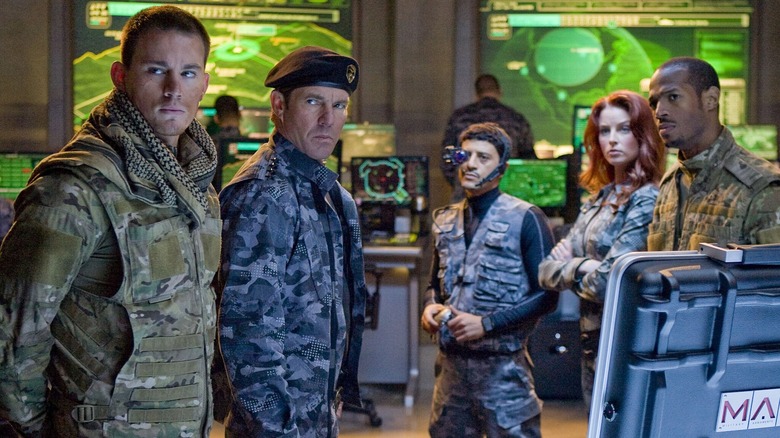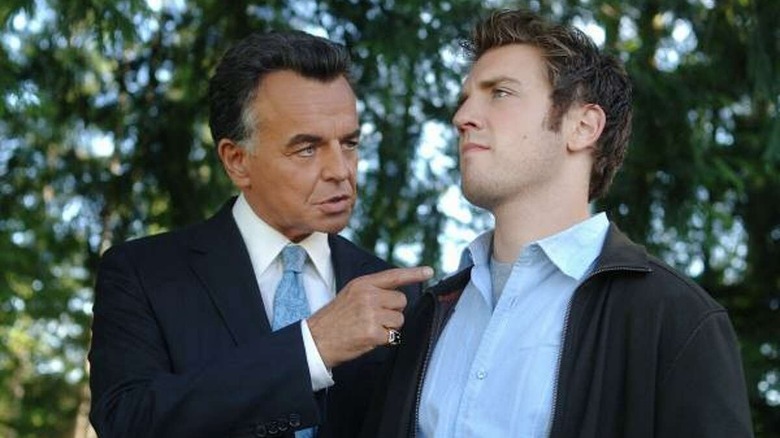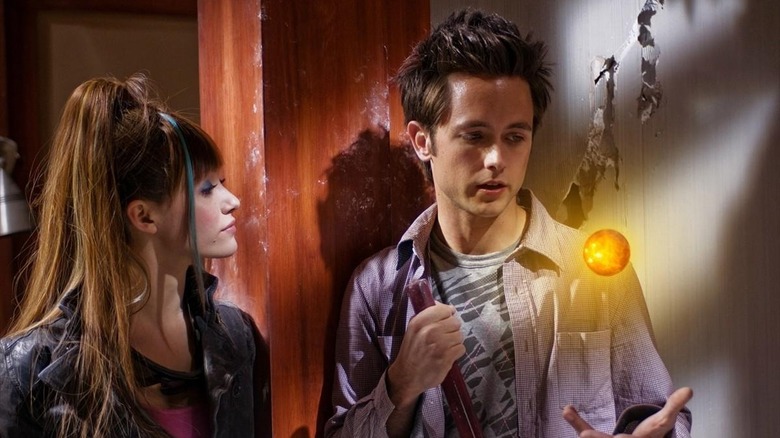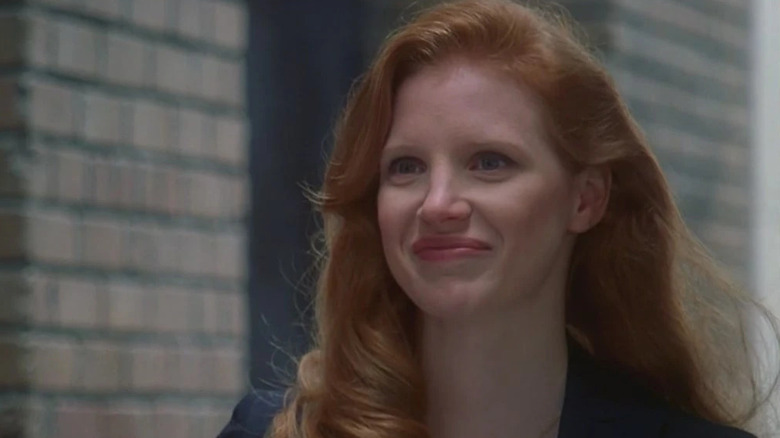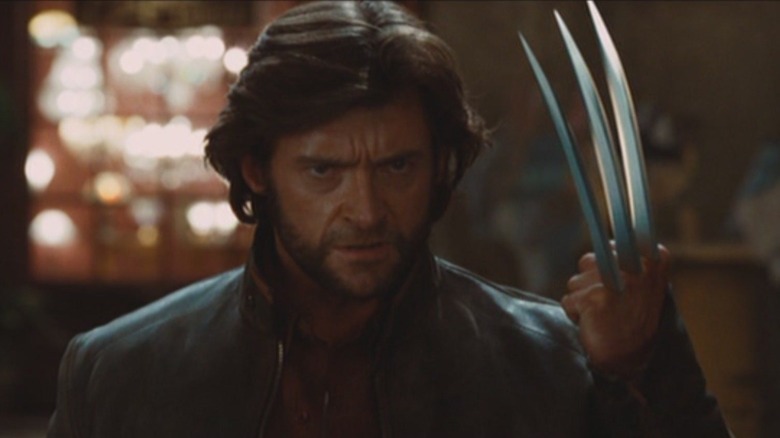The Worst Movies And Shows That Were Products Of The 2007-2008 WGA Strike
At the beginning of May 2023, the Writers Guild of America officially declared a strike in protest of major Hollywood studios' unwillingness to dedicate more funding for writers in TV and film. A lot has changed in the entertainment industry since the last Writers Guild strike, which lasted from November 5, 2007 to February 12, 2008, pushing Hollywood scribes to put their foot down with some serious demands about the future of their careers.
The two biggest issues on the table for Writers Guild members: a larger cut from residuals of streaming shows, and regulation on AI tools like ChatGPT replacing writers' jobs. Although negotiations between the WGA and Hollywood studios were underway earlier in 2023, many major studios like NBCUniversal, Netflix, and Paramount refused to even counter the Guild's demands, resulting in the largest interruption to the entertainment industry since the start of the COVID-19 pandemic.
Although many television shows and film productions will continue without any viewers noticing, this strike can have monumental effects on future content thanks to the absence of a writer on set to help make rewrites. For TV shows, this could also mean their season orders will be shortened, which can often lead to planned plotlines being left imperfect. To get a sense of how the Writers Guild strike will affect your favorite shows and movies this time around, let's take a look at some disastrous results of the 2007-2008 strike.
Friday Night Lights
Sadly for many shows, the effects of the 2007 Writers Guild strike left a bad taste in viewers' mouths. This is certainly the case with "Friday Night Lights," which aired its second season throughout most of the strike's duration from late 2007 to early 2008. While the season was originally meant to have 22 episodes, it was shortened to 15 as a result of production being halted by the strike, which ruined the show's ability to wrap up one of the season's most controversial plotlines.
At the start of Season 2 of "Friday Night Lights," viewers at home were stunned to watch Landry (Jesse Plemons) rescue his friend Tyra (Adrianne Palicki) from an assaulter, killing him in the process. This murder plotline was a huge departure from the tone established by the first season, but it set the pattern for a season full of missteps and odd narrative choices.
Thanks to the Writers Guild strike shortening the season's length, the show's writers were unable to wrap up the season, particularly this plotline involving Landry committing a murder, as well as they should've. As a result, Landry actually gets away with the murder by the end of the season, which confused many viewers at home. The poor ratings and reception for Season 2 of "Friday Night Lights" even put the hit show in jeopardy of being cancelled, although a third season renewal saved it.
Quantum of Solace
"Quantum of Solace" was Daniel Craig's second outing as James Bond, following 2006's "Casino Royale." Although Craig's portrayal of the iconic spy was universally beloved in its predecessor, "Quantum of Solace" was a step in the wrong direction. Most of the film's shortcomings, however, were a direct result of the 2007 writers' strike, with the most recent draft of the script by Paul Haggis not completed until hours before the strike began.
However, this draft still wasn't where it needed to be for the film to be the best version of itself. As a result, Daniel Craig and director Marc Forster had to take matters into their own hands. Since a writer could not be present on set for rewrites, Craig and Forster worked out most of the film's issues themselves without taking writing credit. As Craig later recounted to Time Out while promoting the follow-up "Skyfall" in 2012, "There was me trying to rewrite scenes -– and a writer I am not."
Thankfully, given its status as a 007 flick, "Quantum of Solace" still performed incredibly well at the box office despite reviews that criticized the film's overstuffed action sequences and overall lack of quality compared to the previous film in the franchise. Though "Quantum of Solace" is largely considered Craig's worst Bond movie, the series redeemed itself with "Skyfall." That 2012 follow-up had its own hurdles to jump due to MGM filing for bankruptcy, but overall produced a film that reminded audiences how great a Bond film can really be.
Terminator: The Sarah Connor Chronicles
"Terminator: The Sarah Connor Chronicles" premiered in January 2008, only two months into the Writers Guild strike, and production on the show was affected by the strike even as it got off the ground. "The Sarah Connor Chronicles" was intended to center around the lives of "Terminator" franchise characters Sarah Connor (future "Game of Thrones" star Lena Headey) and John Connor (Thomas Dekker) following the events of "Terminator 2: Judgment Day."
Although it was originally picked up by Fox with a 13-episode order for its first season, the writers' strike resulted in the final four not being produced, leaving the season with only nine episodes total. Compared to other shows, however, "Terminator: The Sarah Connor Chronicles" lucked out, with its ninth episode acting as a perfectly adequate season finale. Furthermore, the show was later picked up for a second season with 22 episodes, including the four that had been originally slated to end season one.
Sadly, "Terminator: The Sarah Connor Chronicles" was cancelled by Fox shortly after the end of its second season, though creator Josh Friedman doesn't view its shortcomings as a result of the strike in a negative light. Perhaps things would've ended differently for the cult show had the writers' strike not short-changed its first season, but at least the cast and crew have gone on to much bigger projects since.
Terminator Salvation
Ironically, the death of "Terminator: The Sarah Connor Chronicles" wasn't the only casualty the franchise suffered thanks to the 2007-2008 Writers Guild of America strike. The labor stoppage also had an impact on the 2009 film "Terminator Salvation," starring Christian Bale, Bryce Dallas Howard, and Sam Worthington. However, the lack of an on-set writer was only one of many problems that "Terminator Salvation" experienced, making for one of the biggest off-screen disasters in recent cinema history.
Although Jonathan Nolan, who later created "Westworld," was hired to write the script and be on set for rewrites, he ended up leaving the project due to the strike. Additionally, the film's production was marred by controversy when audio leaked of Bale ranting on the set of the movie, which put an even bigger stain on the film before it had even released. In hindsight, Bale spoke of the film's difficulties, including Nolan's departure, to IndieWire, saying, "I wish we could have reinvigorated [the 'Terminator' franchise] ... unfortunately, during production, you could tell that wasn't happening."
Despite Bale's hopes that the film would turn out well regardless of its troubles, that was sadly not the case. The film underperformed at the box office during its opening weekend, with reviews panning it for its lackluster script, which even garnered criticism from former franchise stars Arnold Schwarzenegger and Linda Hamilton. It seemed everything was working against the attempted series revival, starting with the lack of a well-constructed story.
Heroes
"Heroes" originally premiered on NBC in 2006, becoming one of the network's quickest hits after its first season, both critically and in ratings. To follow it up, creator Tim Kring planned to go even bigger with its second season, planning to incorporate three separate story arcs: "Generations," "Exodus," and "Villains." However, the show ran into some difficulties that just so happened to intersect with the start of the 2007 writers' strike.
Shortly into the second season's airing in fall 2007, it was clear that the show was disappointing its longtime viewers, which resulted in a course change from Kring and the rest of the creative team. It was so bad, in fact, that Kring issued an apology to fans via Entertainment Weekly, explaining the decisions behind the season's slower pace and failure to properly introduce new characters to the series, saying, "We assumed the audience wanted season 1 ... They wanted adrenaline."
As a result of the fan criticism, as well as the writers' strike interrupting production, the "Exodus" plotline was shelved entirely, and the "Villains" arc was saved for season 3. Furthermore, NBC cancelled "Heroes: Origins," a spin-off miniseries that was meant to air mid-season, as a result of declining ratings and the impending strike possibly shutting down production before it even started. "Heroes" ran for an additional two seasons once the strike ended in 2008, though its ratings slowly dwindled over time and sadly never returned to their Season 1 highs.
Transformers: Revenge of the Fallen
Michael Bay's "Transformers," released in 2007, was a massive success for the iconic franchise, and sparked a film series that's still going strong to this day. But its 2009 sequel, "Transformers: Revenge of the Fallen," faced some development trouble thanks to the writers' strike, and production went on to be rushed thanks to prospective strikes for both the Directors Guild of America and the Screen Actors Guild.
The film was set to be written by Robert Orci and Alex Kurtzman, who helmed writing duties for the first film, along with Ehren Kruger. However, the 2007 writers' strike came right at an inopportune time for the writers. As Orci and Kurtzman later recounted in an interview with First Showing, all they had by the time the strike began was an outline, explaining, "The second the strike ended, it was like ... two months between starting to write and day one of direction." During the time of the strike, Bay expanded their initial outline into a treatment that heavily focused on action sequences.
Predictably, "Transformers: Revenge of the Fallen" was a letdown compared to its predecessor. Most of the issues critics had with the film stemmed from its script and pacing, consequences of the film's struggles thanks to the writers' strike. Particularly, film critic Roger Ebert panned the film as often as he could, writing in The Chicago Sun-Times that it marked "the end of an era" among "CGI-based action epics."
Gossip Girl
In 2007, The CW was still a fledgling network that hadn't yet found itself a certified hit TV series. That all changed with "Gossip Girl," led by a breakthrough performance from Blake Lively as a Manhattan socialite who is the subject of the anonymous titular blogger and series narrator. It would eventually become an incredibly huge hit, defining The CW and its output for years to come.
However, the show didn't initially start out as a surefire slam dunk for the network. Only 13 episodes of the series had been produced by the time the 2007 Writers' Strike hit the entertainment industry, putting the show's future in jeopardy. Over the next few months, The CW prioritized reruns of the series, given their limited content at the time, increasing its viewership gradually. By the time the final five episodes of the first season aired in 2008, the show had begun to accrue enough of a fanbase to warrant a second season renewal.
Ultimately, "Gossip Girl" actually became a rare instance of the writers' strike being beneficial for a show's success in the long run. However, many diehard fans of the series noticed a steep decline in the show's writing quality following the 13th episode of Season 1. In a Vanity Fair retrospective of the series in 2017, producer Joshua Safran credited the post-strike environment as one when "people knew what the show was," resulting in much more attention to the show, despite losing its natural momentum midway through the first season.
Land of the Lost
While many film and TV productions were paused during the 2007 writers' strike, studios took the opportunity to rush others well enough into production so that the strike wouldn't affect progress. This was the case with "Land of the Lost," a film remake of a 1974 children's sci-fi series following a family who fall through a time warp and end up in a prehistoric world inhabited by dinosaurs and mysterious lifeforms. The film version operates under a similar premise, albeit slightly different.
In the 2009 film, Will Ferrell stars as a disgraced paleontologist who teams up with a research assistant (Anna Friel) and a theme park owner (Danny McBride) as they adventure into a world similar to that of the original TV series. By the time the writers' strike finally hit in November 2007, "Land of the Lost" was deep into pre-production, with extensive practical sets and costume design to recreate the 1974 show's prehistoric setting, all being prepared to begin shooting in March of 2008.
But for Universal Studios, investing all those resources into a prospective comedy blockbuster based on an obscure '70s children's show didn't turn out the way they had hoped. "Land of the Lost" bombed at the box office, and reviewers weren't any kinder to it. Even the producers of the original series, Sid & Marty Krofft, criticized the project's misguided direction, leaving their beloved franchise another casualty of studios refusing to negotiate with writers.
Pushing Daisies
Unfortunately, "Land of the Lost" wasn't the only project starring English actress Anna Friel to succumb to the effects of the 2007-2008 Writers Guild of America strike. The actress also starred alongside Lee Pace on "Pushing Daisies," an ABC fantasy series about a pie-maker with the ability to resurrect the dead, a skill he uses to solve crimes alongside his childhood crush, who he previously revived. Although the show was a critical success, its first season was nearly derailed by the writers' strike.
By the time the strike hit, only 9 of the first season's 13 ordered episodes had been written, forcing the show's creator, Bryan Fuller, to make adjustments so that the ninth episode would serve as a cliffhanger ending to the season. Thankfully, ABC renewed the show for a second season, but rather than make up for their four lost episodes, they were only renewed for another 13, but sadly Fuller's plan to leave audiences hanging at the end of Season 1 in the hopes they'd come back didn't pan out so well.
Following a decline in ratings during the second season, ABC opted instead to cancel "Pushing Daisies" mid-season rather than pick it up for more episodes. Although the show has kept a dedicated fanbase since, Lee Pace lamented the strike's effect on the show, telling Vulture, "Our writers were such a big part of our lives." On the bright side, his performance on the failed show ended up securing him a role in Peter Jackson's "The Hobbit" trilogy.
Star Trek (2009)
The 2009 "Star Trek" reboot starring Chris Pine and Zachary Quinto was far from a critical or commercial failure by any means, successfully relaunching the franchise for a modern audience. However, the 2007 writers' strike took place in the middle of the film's principal photography, which complicated things for director J.J. Abrams and producer Damon Lindelof, who were both members of the Writers Guild of America.
Despite his support for the strike, Abrams remained on-board as director of "Star Trek," though out of loyalty to the Writers Guild, he opted to not do any writing work on-set. As he told Variety at the time, "If I didn't stand with my fellow writers, I'd feel it in my gut." This decision, while justified, meant that Abrams could not make any adjustments or improvisational additions to the script on the fly, though directorial adjustments could make the cut, such as changing one sequence from a physical fight to a gunfight during production.
Abrams' stance with the strike also meant he had to abandon one idea to have Nichelle Nichols, the iconic actress who played Uhura in the original series, appear in the film as the grandmother of Zoe Saldana's Uhura. Though the final film was a success anyway, it was frustrating for Abrams to know that he wasn't able to take advantage of every idea he had for it as a result of the writers' strike. Of course, he likely felt better than he would have after scabbing.
Bones
"Bones" was early in its run airing on Fox by the time the entertainment industry was shaken by the 2007-2008 writers' strike. Like many other shows that were simultaneously airing and in production during the strike, the third season of "Bones" was shortened from 20 episodes to 15. This had a devastating effect on the third season's central plotline, which centered on a serial killer known as Gormogon who is secretly working with a member of the show's forensic scientists.
However, given the season's shortened length, it was difficult for the writers to properly lay the groundwork for their big twist: that lab assistant Zack Addy (Eric Millegan) was to be revealed as the Gormogon's apprentice via brainwashing. Once the writers had returned from the strike, they only had two episodes to work with, and Millegan himself wasn't even informed of the twist until production resumed in spring of 2008.
While the rushing of this plot came close to ruining the show, many fans of "Bones" felt that the performances of the actors sold the twist better than any groundwork the writers could've set up. However, if the writers didn't have to go on strike to protect their livelihoods, they would've examined Zack's Season 3 story arc a lot deeper, digging into his unexplored PTSD from the military. Nevertheless, later seasons of the Fox show reintroduce Zack in guest appearances as a truly terrifying villain in the "Bones" universe.
G.I. Joe: The Rise of Cobra
"G.I. Joe: The Rise of Cobra" didn't need a writers' strike to get off to a bad start. The live-action film adaptation of the iconic Hasbro toy line and 1980s animated series had been in development since the '90s. When a version of the script was leaked online in 2005, fans protested the decisions being made with the franchise, resulting in extensive rewrites taking place over the next few years. However, the film faced further setbacks thanks to the 2007 writers' strike, which landed just before filming was to begin.
In anticipation of the strike, screenwriter Stuart Beattie had six weeks to turn in a draft of the film, though in an interview with The Hollywood Reporter, he described that the writing process already wasn't as smooth as it could've been: "For the first three weeks, I really didn't write very much at all. I just was concentrating on structure." According to director Stephen Sommers, the film would've fallen behind schedule due to the writers' strike if Beattie didn't have source material to base the script off of.
Although the film succeeded at the box office, Beattie's rushed efforts didn't end up satisfying moviegoing audiences, or even die-hard fans of the franchise. Film critic Roger Ebert, while admitting the final product was better than "Transformers: Revenge of the Fallen," wrote in The Chicago Sun-Times, "[The film's] plot details are not developed at great depth, because the movie is preoccupied with providing incomprehensible wall-to-wall computer-generated special effects."
Reaper
You'd be forgiven for not remembering "Reaper," the satanic comedy on The CW which ran for two seasons. The series, admittedly, had a lot of potential as a success story for the network, premiering in 2007 — the same month as "Gossip Girl," in fact. However, the two shows featured wildly different premises; "Reaper" follows a down-on-his-luck young adult, Sam (Bret Harrison), who is coerced into becoming a bounty hunter for the Devil (Ray Wise). Much like "Gossip Girl," however, the show was struck by crisis when the Writers Guild strike interrupted production on the first season.
As a result of the strike, "Reaper" stopped airing new episodes after ten, waiting until the strike was over to air the three they had produced before the strike, as well as the five they were able to produce afterwards. By the time the first season ended, it appeared that "Reaper" was going to be on The CW's chopping block, until they surprisingly renewed it for a second season, only for it to be cancelled a year later. This resulted in the creators having to abandon their plans for a third season, which would've revealed Sam's father was originally a demon.
Although some fans lamented the show's ending, it was overall the right move for the network. As Paste Magazine memorialized, "["Reaper's"] slacker-bro brand was always going to be a hard fit for a baby network who found its own early brand being shaped by the wild successes of rich-kid melodramas like "Gossip Girl."
Dragonball Evolution
There aren't many big studio films that disappointed franchise fans as much as "Dragonball Evolution," which adapted the iconic Japanese manga and anime series for western audiences into a live-action martial arts film. The film's origins had begun years prior, when 20th Century Fox bought the rights to make a "Dragonball" live-action feature. However, development had been stalled for many years, until finally the 2007 writers' strike came.
Though it was never confirmed by those who worked on the film, it's widely believed by many "Dragonball" fans that the film's shelved script was finally greenlit due to a lack of new projects as a result of the writers' strike. Variety reported on "Dragonball Evolution" entering pre-production only a few days after the strike began in November 2007, with shooting beginning a month later and no union writer allowed on set to help with rewrites or on-the-fly changes.
Following the film's release, it was near-universally hated by both fans of the franchise and those unfamiliar with the origins of "Dragonball." The film received further criticisms for casting Caucasian actors like Justin Chatwin and Emmy Rossum as lead characters Goku and Bulma, respectively. Furthermore, actor James Marsters, who played Piccolo, alleged that the film's actual budget was much lower than he had been told, meaning that by a stroke of near-impossible chance, the writing of "Dragonball Evolution" was far from its biggest problem. If only the studio could've used its resources better during the strike's dry period.
Journeyman
"Journeyman" debuted on NBC only a few months before the 2007-2008 Writers Guild strike began, though it lucked out compared to most other shows on television at the time. The series' first season order of 13 episodes had all been produced before the strike began, meaning they didn't have to pause production or lose the benefit of having a writer on-set. Furthermore, the show boasted a cast headlined by Kevin McKidd, with guest stars including Jessica Chastain and Scott Michael Campbell.
Sadly, "Journeyman" suffered from bigger problems during the writers' strike. Although the series received good reviews, it struggled with poor ratings throughout its debut season, ultimately resulting in NBC's decision to cancel it. As The Hollywood Reporter wrote regarding the series' cancellation, "Since the production of most scripted series has been suspended because of the strike, such orders are considered a vote of confidence to the shows and a potential renewal for next season if the additional episodes can't be produced by the end of this season." Unfortunately, "Journeyman" was not one of those series that NBC was confident in.
The show's quick death didn't stop fans from trying to get it renewed regardless. In a blog post, the show's creator Kevin Falls expressed gratitude to the fans among disappointment that the show would not continue. "Journeyman" remains one example of a show on TV that just wasn't strong enough to survive a crisis in the television industry like many others did.
X-Men Origins: Wolverine
"X-Men Origins: Wolverine" is a far cry from Hugh Jackman's turn as the mutant Wolverine in 2017's critically-acclaimed "Logan." The film was meant to be a crowd pleaser, giving some highly anticipated solo time for Jackman's iconic interpretation of one of Marvel's most popular heroes. Nevertheless, the film was struck with difficulties early into production, with future "Game of Thrones" co-creator David Benioff's violent, gritty script being severely overhauled at the last minute by James Vanderbilt and Scott Silver to achieve a PG-13 rating.
Once the 2007 writers' strike hit, the film's script was nowhere near where it needed to be for a smooth production. Furthermore, there were no writers allowed on set, which posed quite a problem for some actors. This especially created a dilemma for Ryan Reynolds, who had for years been trying to persuade 20th Century Fox to let him make a "Deadpool" movie. Reynolds was given the opportunity to introduce the character in "X-Men Origins: Wolverine," though with a catch.
Thanks to the writers' strike, Reynolds' Wade Wilson had no dialogue in the script, which resulted in the actor having to improvise on set. As the actor later described to GQ, "In the stage directions it just said, 'Deadpool shows up, talks really fast, and makes a lot of jokes.'" Though it would take quite a while for Reynolds to get another shot at the character, many fans do agree that his appearance is the best part of the film by a long shot.
